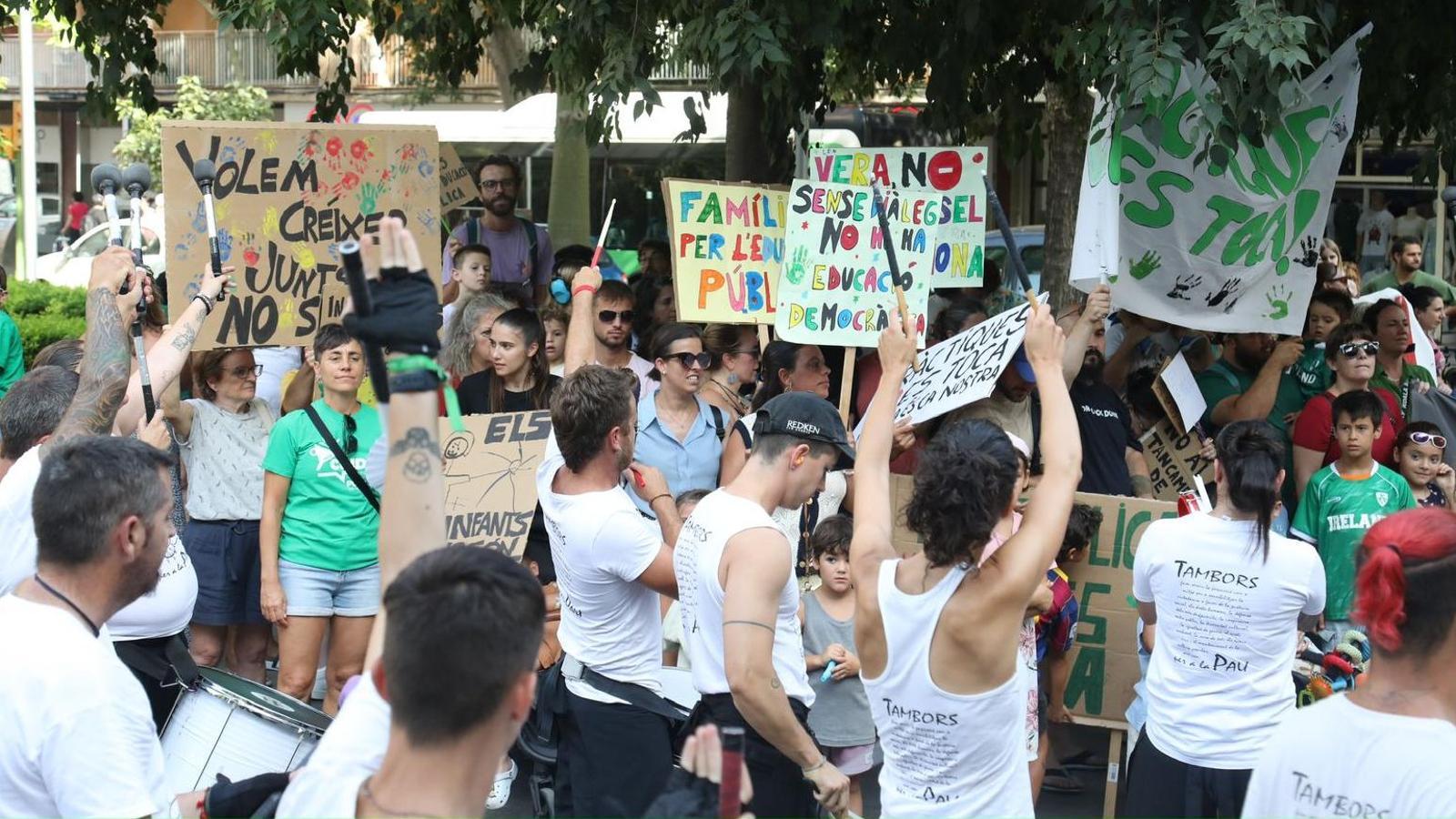Green shirts also stand against attacks in public schools
More than 200 teachers, family members, and students are protesting the closure of the IES Politécnico, as well as the disappearance of public education services throughout the Balearic Islands.


PalmGreen t-shirts have invaded Palma's Plaza de París. More than 200 people (500, according to the organizers), including family members, teachers, and students, gathered at the initiative of the "La pública no se tocar" (Public Education Is Not To Be Touched) platform to protest the progressive disappearance of school places promoted by the Ministry of Education. "The education and future of children and young people cannot be played with. We don't want them to have to go to overcrowded schools. They have the right to go to their neighborhood school. We don't want families to be forced to send them to private schools they haven't chosen, with ideologies they don't share. They have the right to a quality public education, and equity for all students," the protesters demanded. Along the same lines, they have demanded a "strong, accessible, and sufficient" public education network to meet the social needs of each area, "as required by Article 104 of the Balearic Islands Education Law (LEIB)."
Despite the heat in Palma today, people from all over Mallorca joined the protest, the first of the legislative term against the cuts in public school places. "We don't want a broken school, we want a living school"; "Vera, enough destruction"; "We want the school we chose"; "Vera, don't break what works"; and "More education and less politics," among others, were some of the signs that adults, but also children, displayed to assert their position.
The manifesto has recalled that The Polytechnic High School is in the process of disappearing to become an Integrated Vocational Training Center (CIFP). Next year, there will no longer be any students in the first year of ESO. As a result, the Palma Centre area will have one less school for children who must enroll in secondary school, coming from the CEIP Aina Moll, CEIP El Terreno, CEIP Génova, CEIP Rey Jaume I, and CEIP Santa Catalina. The consequence will be that the IES Ramon Llull and Joan Alcover will be filled, and also that the privately-funded school will take advantage of the disappearance of public places to increase the number of clients. "The public network is being progressively and silently cut back and dismantled, leaving behind the principles of equity, quality, and social justice that institutions should guarantee. It is time to put resources where they are needed. It is time to defend public schools, which help to weave a more just and integrated society," the organizing entities defended.
Right to a local public school, denied
Families, the platform has claimed, have the right to quality public education in their neighborhood, "without having to rely on a car, bear additional costs, or be forced to choose unwanted options." This is the case of the CEIP Castillo de Santa Águeda (Ferreries), where 11 families of fourth-grade children who wanted to attend public school have been excluded. If they want to enroll their children, they will have to attend the Sant Francesc charter school or try their luck in another municipality. There were solutions to avoid this, as the Castillo de Santa Águeda school is willing to open a new public school. The Ministry of Education has not accepted this.
In Palma, the Felip Bauçà Primary School is also closing, and the students are moving to the new Tramuntana Primary School. Therefore, of the 650 planned places, only 200 (one line) will be newly created. Once renovated, the Felip Bauçà building will become the 0-6 cycle of the CEIP de Prácticas (Practice Primary School), which will become a large school with three lines per year. "The children of the Femu neighborhood, who in recent years have had to attend schools outside the city due to a lack of places, will no longer be able to attend their neighborhood school. And the new families in the housing units under construction will also be expelled from their neighborhood. In addition, the other schools in the area will suffer the consequences: overcrowding, a loss of educational quality," with the problems of school enrollment in the former Palma B zone. It's worth remembering that the Femu area suffers from a significant problem with school places. Many buildings have been built, but the educational facilities are not keeping pace.
In Palma B, 200 new places will now be added for Preschool and Primary education, but it will take years until the new secondary school planned behind the Conservatory, in the future Arts District, is completed. For now, the existing secondary schools (IES Josep Maria Llompart, IES Madina Mayurqa, IES Joan Maria Thomàs, and IES Son Pacs) will still face more academic pressure at a time when it is already extremely high. Currently, and for years now, the aforementioned secondary schools have alternating schedules. So one year begins, for example, at Son Pacs, the other at Madina, and so on. This reality is determined by the fact that no public secondary school has been built in Palma for 22 years. The last was IES La Ribera, in 2003. Regarding schools, the CEIP Tramuntana is now coming, but it has been 20 years since one opened, the CEIP Cas Capiscol (2005). In these two decades the school population has multiplied, linked to the boom demographic.
For now, the entities and unions that make up the platform are the Association of Families of CEIP Practices, AFA CEIP Aina Moll, AFA IES Politécnico, AFA IES Joan Alcover, AFA IES Ramon Llull, FAPA Mallorca, Association of Primary School Directors of Mallorca (Adipma) of Assemblea Docentes del IES Politécnico, the Assembly of Teachers of CEIP Santa Isabel, the Association of Neighbors La FEMU, UOB, Union, Alternativa, SIAU, STEI, UGT, CCOO.
